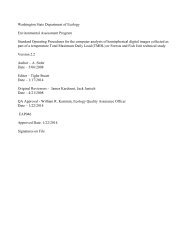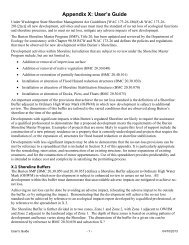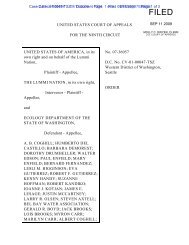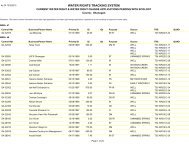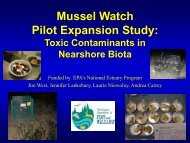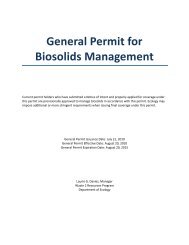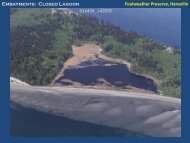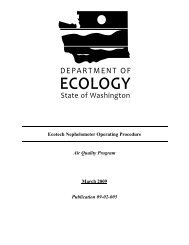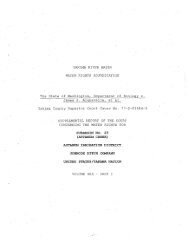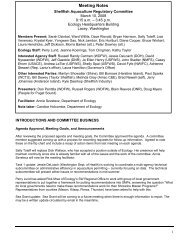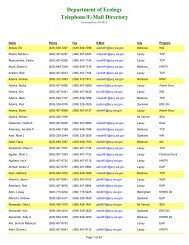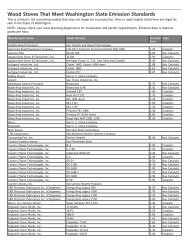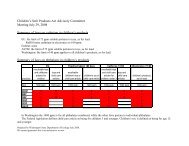WRIA 62 WMP 032305 - Washington State Department of Ecology
WRIA 62 WMP 032305 - Washington State Department of Ecology
WRIA 62 WMP 032305 - Washington State Department of Ecology
Create successful ePaper yourself
Turn your PDF publications into a flip-book with our unique Google optimized e-Paper software.
March, 2005 -68- 023-1289-003.3040<br />
Because salmonid recovery planning is a <strong>State</strong> <strong>of</strong> <strong>Washington</strong> planning process, the geographic focus<br />
area is <strong>WRIA</strong> <strong>62</strong>. This overlaps directly with the HB 2514 Watershed Planning efforts area. Focal<br />
species for this effort have been native salmonids, specifically bull trout, westslope cutthroat trout,<br />
and pygmy whitefish. The goal <strong>of</strong> the Pend Oreille Salmonid Recovery Team is to support native<br />
salmonid recovery in <strong>WRIA</strong> <strong>62</strong> by improving priority native salmonid habitat through a cooperative<br />
effort between private citizens and local, state, federal, and tribal governments. As the Lead Entity,<br />
the Pend Oreille Conservation District provides the forum and administrative support for the process.<br />
The <strong>WRIA</strong> <strong>62</strong> Salmonid Recovery Planning Process has developed a plan entitled Strategy for<br />
Protection and Improvement <strong>of</strong> Native Salmonid Habitat in the Pend Oreille Watershed, <strong>Washington</strong><br />
Water Resource Inventory Area <strong>62</strong> (Strategy). This report (Pend Oreille Conservation District, 2004)<br />
is a living document, updated as required for each grant cycle and when new information becomes<br />
available. This report is included within Appendix I. Currently (as <strong>of</strong> July, 2004) the Strategy<br />
document has been completed for the 5 th round <strong>of</strong> the 2004 Salmon Recovery Funding Board grant<br />
cycle.<br />
The Pend Oreille Salmonid Recovery Team comprises a Citizens’ Advisory Group (CAG) composed<br />
<strong>of</strong> local citizen stakeholders and a Technical Advisory Group (TAG) <strong>of</strong> federal, state, local<br />
governments and tribes that guides the technical components <strong>of</strong> the work. Members <strong>of</strong> the TAG and<br />
CAG for <strong>WRIA</strong> <strong>62</strong> are listed the Strategy document included in Appendix I.<br />
In addition to the Pend Oreille Salmonid Recovery Team, there are a number <strong>of</strong> other habitat<br />
programs ongoing in <strong>WRIA</strong> <strong>62</strong>, including WDFW, Seattle City Light, Pend Oreille PUD No.1 and<br />
Kalispel Tribe’s Natural Resources <strong>Department</strong> programs. The Watershed Planning Unit agreed that<br />
there is a need to consider coordination with these groups and programs.<br />
4.3.2 H-2 Background and Rationale<br />
Problem <strong>State</strong>ment: Invasion <strong>of</strong> noxious terrestrial weeds has the pote ntial to degrade water<br />
quality and terrestrial, riparian and aquatic habitats by increasing water yield run<strong>of</strong>f and<br />
preventing the establishment <strong>of</strong> native vegetation.<br />
With continued growth and development in Pend Oreille County, the Pend Oreille County Weed<br />
Board identified a need to improve public understanding about the potential for noxious weeds to<br />
degrade water quality and terrestrial, riparian and aquatic habitats by increasing water yield run<strong>of</strong>f<br />
and preventing the establishment <strong>of</strong> native vegetation. The H-2 action items listed in Section 3.3.2<br />
will be implemented (based upon available funding) primarily by the Pend Oreille County Weed<br />
Board working cooperatively with the Pend Oreille Extension and the Watershed Planning<br />
Implementing Body. Watershed Planning Unit members suggested that public education could be<br />
conducted through a property-tax mail insert.<br />
4.3.3 H-3a Background and Rationale<br />
Problem <strong>State</strong>ment: River bank erosion along the mainstem <strong>of</strong> the Pend Oreille River is<br />
resulting in degraded riparian habitat and water quality. The causes <strong>of</strong> erosion need to be<br />
confirmed and mitigated.<br />
During public outreach activities, river bank erosion along the mainstem <strong>of</strong> the Pend Oreille River<br />
was identified by members <strong>of</strong> the public as a concern at both the Newport Centennial and the Pend<br />
Oreille County Fair where surveys were conducted regarding watershed related issues. Flooding and<br />
<strong>WRIA</strong> <strong>62</strong> <strong>WMP</strong> <strong>032305</strong>



